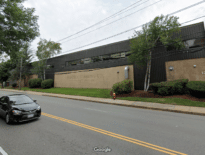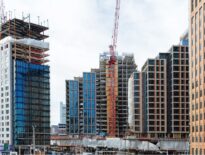
Gov. Charlie Baker speaks to reporters at an April 30 press conference. Photo by Sam Doran | State House News Service
Massachusetts restaurants, retail shops, child care facilities and hotels got the green light Saturday to emerge from their government-induced slumbers beginning on Monday, though every business that reopens will have to follow mandatory safety regulations and industry-specific guidelines for keeping workers and customers safe as the highly-contagious coronavirus continues to circulate.
Gov. Charlie Baker said Saturday afternoon that the public health data the state uses to track the COVID-19 pandemic has been trending in the right direction and that the virus has receded enough to allow another measured step towards what used to be normal. As of Friday, Massachusetts had seen 102,557 confirmed cases of COVID-19, and likely many more, and had lost 7,235 people to the virus.
“This terrible virus and the terrible toll that it takes will be with us until there are medical breakthroughs with respect to treatments or vaccines. But thanks to your hard work and your sacrifices, we’re bringing the fight to the virus. So we’re moving forward and Massachusetts is continuing to reopen,” Baker said, commending residents for practicing social distancing and covering their faces in public.
On Revere Beach, a 7-month-old restaurant that shifted to takeout and delivery service in March is set to reopen this afternoon with a new 100-capacity outdoor dining area.
Dryft owner Michael Aldi reconfigured the outdoor dining area which spans nearly a half-acre, moving tables eight feet apart and updating service practices including online ordering and use of personal protective equipment by servers.
Aldi said in April that the state ban on indoor dining had devastated his business, forcing him to rely on delivery and orders from the 305-unit 500 Ocean Ave. apartment complex which sits above the restaurant. An outdoor bar area is scheduled to open this summer following approval of guidelines for bar seating and occupancy.
Not all of the Phase 2 businesses will be allowed to reopen on Monday, however. Housing and Economic Development Secretary Mike Kennealy said the phase will have two “steps” to it, the first of which will begin Monday and the second of which will be allowed to start at a point “determined based on continued improvements in public health metrics,” the secretary said.
Here’s what can resume normal operations starting Monday, June 8:
- In-store retail, with occupancy limits
- Outdoor dining at restaurants
- Child care centers and day camps
- Hotels and other lodgings
- Warehouses and distribution centers
- Youth and adult amateur sports
- House cleaning, photography, window washing and other personal services that do not require close contact
- Funeral homes
- Outdoor recreation at pools, playgrounds and driving ranges
- Professional sports team practices
Health care providers on Monday can also resume in-person elective, non-urgent procedures and services, including office visits, dental visits and vision care, though elective cosmetic procedures and in-person day programs will remain prohibited until Phase 3.
These businesses and activities can resume later in Phase 2 :
- Indoor dining at restaurants
- Personal services that require close contact, like nail salons, tanning salons, tattoo parlors and body piercing, personal training, massage therapy, hair removal and hair replacement or scalp treatments.
Though the state’s reopening plan calls for the limit on gathering size to be “determined based on trends,” an executive order Baker signed Saturday did not increase the 10-person limit on gatherings indoors or in enclosed outdoor spaces.
While business will begin to reopen and consumers will have greater freedom, the governor and others on Saturday cautioned that things will be a little unusual as employers, workers and customers all get used to the safety measures required to be in place.
“In a world where COVID-19 exists, everything looks little different. We’re asking people to follow new safety protocols, to change how they interact with customers, to stagger work schedules and to work remotely,” Baker said. He added, “Since the middle of March, we’ve asked a lot of everybody here in the commonwealth – every family, every business, every employer, every government agency, every individual – to get to this point, but so far we’ve made tremendous progress. We’ve been successful in bending the curve on COVID-19 and the metrics reflect that.”
Since mid-April, the seven-day average of the positive COVID-19 test rate is down 82 percent, the three-day average of hospitalized patients is down 55 percent and the number of hospitals still relying on their COVID-19 surge capacity is down 76 percent, Baker said.
“We are clearly on the path to beat the virus. But as I said earlier, until there are medical breakthroughs, we have to continue to take the fight and play our part in fighting the virus. COVID-19 is still very much with us and it’s incredibly contagious, and in some cases, merciless to those that are affected by it,” he said. “And while we should all feel a certain sense of relief and progress with respect to the start of Phase 2, we should also keep in mind that we have a way to go to get to what we would call the permanent new normal.”
Indeed, bars, movie theaters, entertainment venues, gyms, museums and casinos remained closed and will stay that way for at least three more weeks. The four-phase reopening plan Baker and Lt. Gov. Karyn Polito detailed last month requires a minimum of three weeks between phases, meaning the absolute earliest possible date that Massachusetts could move into Phase 3 is Monday, June 29.
Though some have slammed Baker for being too slow to reopen the economy, others said this week that the state is not yet ready to move into Phase 2. The Massachusetts Public Health Association and other groups came together to produce a set of criteria that they insist should be met before further reopening. The demands include a significant boost in testing activity and a demonstrated decline in infection rates among populations for which the state has incomplete or zero data on the spread of the coronavirus.
Several of the group’s benchmarks would have precluded Baker from reopening the next group of businesses by Monday.
“Today, Governor Baker chose to ignore these basic standards and instead to put Massachusetts residents at increased risk of illness and death with little in the way of data to track impact on Black and Latinx residents, no meaningful protections for low-wage workers, testing that falls dramatically short of the Governor’s own goals, and – adding insult to injury – no seat at the table for the very communities that stand to be most impacted,” Carlene Pavlos, executive director of MPHA, said. “The Governor claims to always ‘follow the data’ and to ‘listen to the experts,’ but today he did exactly the opposite. For these reasons, we strongly oppose the Governor’s decision today.”
On the other end of the spectrum, the Massachusetts Fiscal Alliance criticized the governor Saturday for splitting the second reopening phase into two steps and delaying the return of some businesses.
“Seems like the Governor is moving the goal post again,” spokesman Paul Craney said. “Phases now have parts. For part 2 businesses, they have to wait even though they thought they could open. It’s tone deaf and out of touch to the concerns of business owners. Cruel to start to introduce parts when it was never originally disclosed on day one.”
As businesses reopen, they can only be successful if consumers feel comfortable venturing out to shop or dine.
“It will be up to consumers to decide with their $’s when & how they will again buy on #MainStreet. But they should be assured that they can shop locally safely,” Jon Hurst, president of the Retailers Association of Massachusetts, tweeted Saturday afternoon. “Consumers=70% of economy. How we spend our $’s in months to come will truly determine futures of countless #SmallBiz.”
Polito, who led the state’s reopening advisory board alongside Kennealy, implored people to shop locally.
“When you buy from the local and small businesses that make up the fabric of your community, you support our Massachusetts economy. You may decide enjoy to enjoy outdoor dining, or visit a local or family-owned restaurant in your neighborhood, one of your favorites,” she said. “Make sure you visit and enjoy some of that experience, I think it will be a lot of fun for all of us. Go to the corner stores and shops in your town centers, they need you.”
Baker, who has been relatively quick on the take-up as businesses and services have returned (he got a haircut in the first few days barber shops were reopened and recently took advantage of new outdoor visitation regulations to visit his father in a long-term care facility), said Saturday that he might dine al fresco next week.
Asked if he plans to take First Lady Lauren Baker out for an outdoor dinner, the governor said, “Maybe. We’ll see what happens.”






